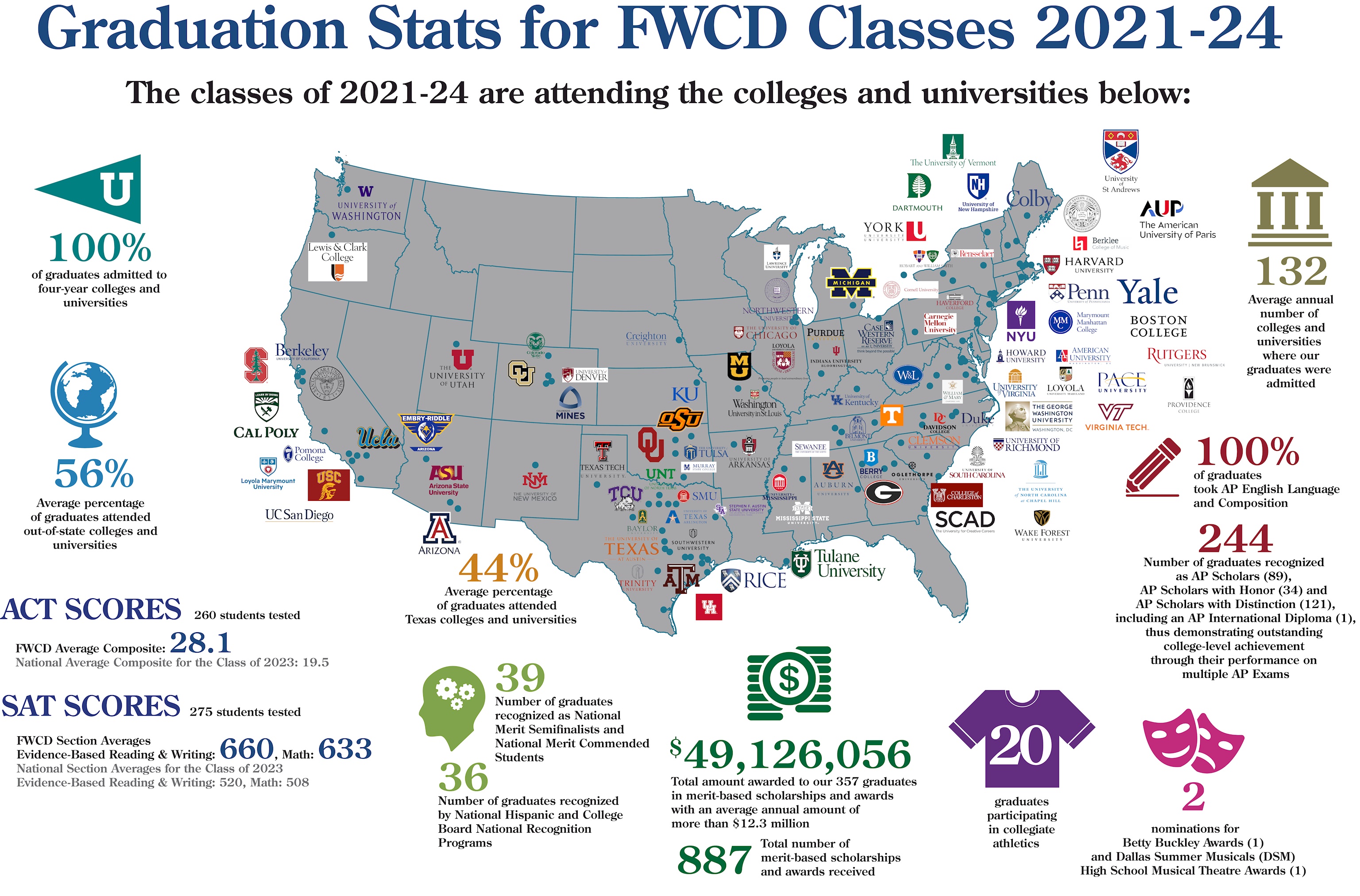College Counseling
FWCD graduates have a 100 percent acceptance rate for four-year colleges and universities across the U.S. and internationally.
Academic and personal development of each student is the foundational reason for such success. But at FWCD, we go even further to ensure that every family understands the college admission process, and every student is prepared to excel in the next stage of their education.
The quality and the quantity of our College Counseling program is unmatched. FWCD offers dedicated College Counselors whose main focus is to connect students and their families to the resources and information they need to make the best decisions regarding their academic future.
Navigating the College Admission Process
Our program helps students understand themselves, feel empowered and knowledgeable. This starts with broad information in the freshman and sophomore years.
In the junior year, students begin the college search process in earnest and take a College Counseling class that fully guides them through all the details and requirements related to life beyond FWCD.
During senior year, the College Counselors provide support as students draft and hone their personal essays and complete their applications. In the spring, they guide families through their decision-making process.
We go the extra mile to ensure that every family understands the college admission process, and every student is prepared to excel in the next stage of their education.
Finding the Best College for You
Finding a student’s best match in a college or university is a daunting task. FWCD has elevated the College Counseling program with quality and quantity, creating outstanding opportunities for students and parents/guardians to be informed about the entire college process.
Contact Us
We look forward to working with your family. Please contact our office if you have any questions about the college counseling program at FWCD. We can be reached at 817.302.3246 or [email protected].
College Planning Timeline
Freshman Year
- It’s never too early to plan for the future!
- Build strong writing and critical thinking skills by taking challenging courses
- Study hard and get excellent grades
- Strengthen your vocabulary by increasing your reading
- Become involved in extracurricular activities
- Browse through college literature or surf the web to get an idea of what kinds of schools may be of interest to you
- Check out what high school courses colleges require
- Know NCAA (National Collegiate Athletic Association) Eligibility Center requirements if you want to play sports in college
- Keep an academic portfolio and extracurricular record
- Research career possibilities
- Begin saving money for college
Sophomore Year
- Concentrate on academic preparation and continue to develop basic skills and extracurricular interests
- Take the PSAT in October. The PSAT is a practice test for the SAT. The results will not be used for college admission
- Take the Practice ACT
- Sign up, if you have not done so already, for extracurricular activities that interest you. The level of involvement and accomplishment is most important, not the number of activities.
- Keep a record of your extracurricular involvement, volunteer work, and employment (all year)
- Start researching colleges and universities. Surf the Web and check out college and university homepages. The College Board’s website is an excellent place to begin searching.
- Plan now for wise use of your summer. Consider taking a summer course or participating in a special program (e.g., for prospective engineers or journalists or for those interested in theatre or music). Consider working or volunteering. Make your summer productive.
- During the summer, you may want to sign up for a PSAT/SAT prep course, use computer software, or do the practice tests in books designed to familiarize you with standardized tests. A little discipline goes a long way!
- Continue reading to increase your vocabulary
Junior Year
- Attend Junior College Counseling Course
- Attend the FWCD College Day in September
- Visit with college representatives
- Take the PSAT/NMSQT in October
- Visit colleges
- Refine college list
- Attend your Junior Conference, a conversation with your parents and one of the college counselors about your path through the college application process and beyond
- Complete Common Application, write college essay, compile resume and request at least one teacher letter of recommendation (part of your College Counseling Class requirements)
- Take the SAT in March or May and the ACT in April or June
- Take AP Exams in May
- Register with the NCAA Eligibility Center if interested in participating in collegiate athletics
- If you work, save some of your earnings for college.
Senior Year
- Meet one-on-one with a College Counselor
- Attend the FWCD College Day in September
- Visit with college representatives
- Take the ACT in September or October and/or the SAT in August or October
- Attend Mission Application
- Submit applications by the College Counseling Office's internal deadlines
- Release your ACT and/or SAT scores, unless applying test-optional, directly from each testing agency to the colleges/universities where you have applied. FWCD does not send test scores.
- If interested in applying for Federal student aid, complete the Free Application for Federal Student Aid (FAFSA) https://studentaid.gov/h/apply-for-aid/fafsa in October. Some colleges may also require students to complete the CSS Profile, which can be found on the College Board website at www.collegeboard.com.
- Avoid Scholarship Scams—if you have any questions about the validity of a scholarship program, ask a College Counselor. Remember, you should never have to pay money to receive money! For a list of defendants named in recent scams, check out the Federal Trade Commission’s website.
- Take advantage of every opportunity to interview whether it is on campus or here in the Dallas/Fort Worth area with an alumni representative
- Notify the College Counseling Office of all acceptances, deferrals, or denials
- Notify the College Counseling Office of all offers of merit scholarship from all schools to which you applied and community organizations
- Make final visits to colleges to narrow down an enrollment choice
- Send only ONE enrollment deposit. It should be sent to the one college you plan to attend. DO NOT DOUBLE DEPOSIT!
- College Decision Day (May 1)—Reply to those colleges where you have been accepted to but do not plan to attend.
- Take AP Exams in May
- If you work, save some of your earnings for college.
Helpful Resources for Parents/Guardians and Students
The College Counseling Office strives to work closely with students and families throughout the college search/admission process. Our goal is to make the process as transparent as possible; therefore, good communication is critical. We hope that you find the information provided here to be useful.
Steps in the College Counseling Journey: A Guide of What is Coming and When
Seniors and juniors use Naviance to research colleges, track FWCD admission statistics, and sign up for individual college visits.
The Common Application is used by almost all FWCD students to apply to college. It is accepted at more than 1,000 colleges and universities.
ACT: A standardized college admission exam that includes four curriculum-based tests in English, math, reading and science. Each test is scored on a scale of 1 (low) to 36 (high), and the four tests are averaged to provide a composite score.
The College Board website is an excellent college search tool. It is the oversight agency for many tests and services connected with the college admission process, including the PSAT/NMSQT, SAT, CSS Financial Aid Profile and AP Exams.
Online form that determines eligibility for Federal Student aid-grants, college work study jobs and loans. The FAFSA should be completed in October of the senior year. There is no fee to submit this form.
The National Association for College Admission Counseling (NACAC) is the association dedicated to ethical treatment of students in the college admission process.
Registering online with the NCAA Eligibility Center is the avenue in which eligibility for participation in collegiate athletics is determined. Student athletes are encouraged to register at the end of the junior year. All prospective student-athletes intending to enroll in an NCAA Division I or II institution must complete the NCAA Amateurism Certification questionnaire.
FWCD Details
College Matriculation Map
Contact College Counseling
Phone: 817.302.3246
Email: [email protected]
Follow @FWCD2College on Instagram






